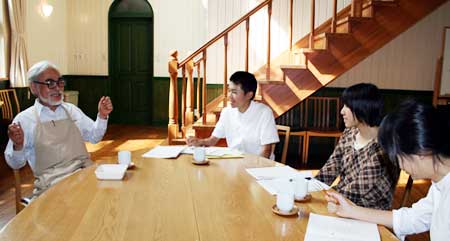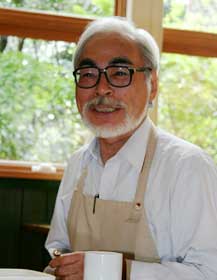
Interview with Hayao Miyazaki, animation film director,Children can raise the spirits of adults and change society

|
| Hayao Miyazaki (left) respond to the junior writers' questions at his film studio in Tokyo. (Photo by Shiori Kosaka, 13) |
What would you say is "the power of children"?
It's difficult to offer a simple answer, since the term "children" encompasses both babies as well as boys and girls in adolescence. The children in the preschool next to my studio give me power. When I hear their crying, their laughter, and their lively voices, it makes me feel happy and at peace. Even young children have the power to raise the spirits of adults.
But when children grow up to be your age, they become more complex. They develop an inner and an outer self and express themselves differently depending on the other person. They start to worry about what other people think as they learn how adults live. They come to know troubles and pain, though, from my point of view, these are things that make them full of life. When I see a lively young person trudging along, I secretly send a greeting of solidarity.
Do you think that children can help change society?
They certainly can. If you just sweep the sidewalk in front of your house each morning, you would see many changes. More people would offer you greetings and you would run into people taking out their trash. If you kept this up, you would eventually sense the minds of these people and see the loneliness and sadness they don't know how to express. But it's hard to keep on in such efforts. While society turns over every 10 or 20 years, a person's way of thinking and their energy can change in three months or half a year. If you make a hasty decision when starting something, you may have difficulties later so don't be in a hurry, please take your time before you begin.

|
| Mr. Miyazaki says: "I hope you'll do the things you can experience only in childhood." |
Is it possible for us to create peace?
Peace can appear in this moment. But it may be lost minutes later. Typically, when we talk about "peace," we're referring to war and peace, and I think it is the responsibility of adults to determine whether they will preserve peace or promote war. My feeling is that peace is preferred no matter how foolish the circumstances. War, though, always arises from a state of peace. Human society is full of foolishness, injustice, dishonesty, and hatred. At the same time, there is ample kindness, devotion, charity, and compassion. Amid this sort of society, the seeds of war sprout. I suggest you think about each case individually instead of taking a more general view of "war and peace." Peace blossoms in war, while war grows from peace.
What, to you, is peace?
I associate peace with paradise. Does paradise exist for human beings on earth? If it exists, what is it like? These have been important questions for me. Now, as I've grown older, I've come to feel that paradise exists in the memory of very young children. Protected by their mothers and cherished by others, children are able to experience the world smiling at them. This occurs only when they are small, but that happy memory becomes an asset for them and perhaps forms the basis for pondering war and peace when they grow up.
When we become adults, do we lose what we discovered as children?
I was a foolish youth and it look me a while to grasp if this was true for myself. I found, though, that what I had experienced as a child remains as a core part of my being even now.
What do you want to give to children through your work?
I'm not trying to give anything to children. Rather, I want children to feel things for themselves, like "The world is a beautiful place" or "I'm glad I was born in this world." Seeing a film, something that is usually concealed deeply in your mind quietly comes into awareness. After the film, it then moves back to that deep part of your consciousness. These are the kind of films I want to make.
Hayao Miyazaki Born in Tokyo in 1941. Film director of animated feature films. His well-known works include "Nausicaä of the Valley of the Wind" (1984), "My Neighbor Totoro" (1988) and "Princess Mononoke" (1997). "Spirited Away" (2001) became the highest-grossing Japanese film in Japan's history, drawing an audience of over 23 million people. In 2005, he received the Golden Lion Award for Lifetime Achievement at the Venice Film Festival.